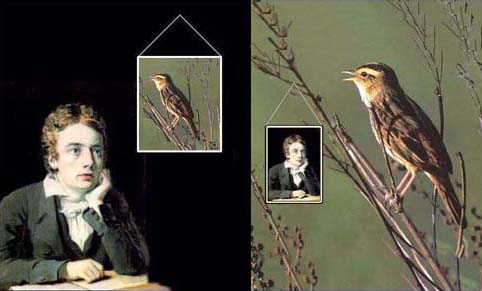
برگـردان: صبورالله ســـياه سنگ
hajarulaswad@yahoo.com
چکامه يي
براي هــــزاردستان
John Keats

1
دلم درد ميکشد
و کرختي خواب آوري روانم را مي آزارد
انگار شوکران را سرکشيده بودم
يا ته مانده افيوني را در خود فروداده باشم
دمي گذشت و آرام آرام در اقيانوس فراموشي جاودانه ته نشين شدم.
اين نه آنست که بر گستره شادمانيت رشک آورد
بلکه شادي سرشارتر از مرزهاي شگفتگي تست،
شگفتگيي که [در پرتو آن]،
تو اي درخت_بانوي سبکبال
در بافه آهنگيني ناژوهاي لب دريا
و سايه هاي بيشمار شان
تابستان را با هزاران زبان سرودي
2
آه! به ياد يک دهان باده پارينه
که روزگاران درازي در ژرفاي زمين خنک نگهداشته شده بود
و نشاني داشت از گل بهشتي و سبزه زاران
پاکوبي و سرود دلدادگان و شادماني آفتابسوخته
آه! به ياد يک پياله پر از باده تلخ
سرشار راستي، آن چشمه جانبخش
با مرواريد حبابهاي چشمک زنان در لبه هاش
و دهاني با نشانه هاي ارغوان
که سرميکشدم و جهان را نديده پدرود ميگفتم
و با تو در تيرگي جنگل رفته رفته نابود ميشدم
3
رفته رفته نيست و ناپديد ميشدم در دوردستها
و يکسره فراموش ميکردم آنچه هرگز در لابلاي برگها نياموخته اي:
فرسودگي و تب و آزردگي را
اينجا که مردمان مينشينند
و به مويه هاي همديگر گوش ميسپارند
جايي که ناتواني واپسين موهاي سپيد و پريش را به لرزه مي آورد
جايي که جواني کمرنگتر و نازکتر شده ميرود تا بميرد
جايي که انديشيدن لبريز شدن از رنج است
و ديدگان سربين ميپژمرند
جايي که زيبايي نميتواند ديدگان هوس انگيزش را نگهدارد
يا عشق تازه فراتر از زمانه بر آنها ميمويد
4
فراسو، فراسو!
براي آنکه به سوي تو پرواز خواهم کرد
نه با گردونه ايزد باده پيما و پلنگانش
بل بر بالهاي نديدني چکامه
گرچه اين مغز فرسوده آشفته ميگردد
و از کار مي افتد
اينک شب با تو شاداب گشته
مهبانو ناگهان بر اورنگ خويش نشسته
با انبوهي از ستاره پريها در پيرامونش
روشني پيدا نيست
مگر آنچه با نسيمي از بهشت ميوزد
از وراي تاريکي کبود و خزه راههاي پيچاپيچ
5
نميتوانم ببينم چه گلهايي زير پاهايم فتاده اند.
و چه چوب_سوزه هاي ملايمي آويز شاخه هايند
ولي گمان ميبرم در تاريکي گوارايي
که خوشگواري ميفزايد
به سبزه، بيشه و درخت ميوه دار خودرو ميبخشد
سوزنبرگهاي سپيد و گلابهاي وحشي
بنفشه هاي زود پژمرنده پنهان در لاي برگها
بلندترين کودک ميانه ماه سرطان
گل سرخ مديترانه فراروينده،
سرشار از باده هاي شبنم
افسون وزوزکنان انبوهه زنبورها بر شامگاهان تموز
6
شبانه را ميشنوم
بارها و بارها بخشي از دلم را
به مرگ آرامي باخته ام
او را در آسمانيترين ترانه ها
به نامهاي گوارايي خوانده ام
براي آن که دم خموشم را به هوا فرستاده باشم
اينک بيشتر از هميشه براي مرگ آماده مينمايد
تا نيمه شبي به آرامي پايان يابد
هنگامي که روحت را به مرگ پيشکش ميکني
در چنان شادمانيي
همچنان سرودي سر خواهي کرد
من به ناکامي گوش خواهم داد
تا سوگنامه بلند تو سبز گردد
7
اي پرنده جاودان! تو براي مرگ زاده نشده بودي
فرزندان گرسنگي به خونت ننشستند
آنچه دوشينه شنيدم
آوايي بود که در روزگار پار جهانگشايان و دلقکان شنيده بودند
شايد همين سرود يافته بود راهي
از دهليز دل غمين آن بيوه بهنام [انجيل]
که دلش براي خانه خودش تنگ شده بود
و اشکريزان ايستاده بود در کشتزار گندم بيگانه
و آنجا که بيشترين روزنه هاي جادويي داشت
روزنه هايي که گشوده ميشدند
رو به حباب درياهاي ترسناک پريزاران وامانده
8
وامانده! اين واژه همانند ناقوس است
ناقوسي که برميگرداندم از تو به روح خويش
پدرود! رويا ديگر نميتواند به زرنگي نيرنگ مان زند
آنگونه که رسواست اين پري کوچک فريبنده
پدرود! پدرود!
واپسين نيايش_سرودت به خاموشي ميگرايد
از سبزه زاران نزديک و از فراز آن آب ايستاده
به سوي تپه راه گشود
و اينک در بيشه روستاي چشمرش
در زير خاک آراميده است.
آيا ديداري [با چشم باز] بود يا روياي برآشوبنده؟
ساز کوچيده است: بيدارم يا خواب؟
[][]
آويزه هـــا
_ John Keats (1795-1821) از نامورترين سرودپردازان انگلستان است.
_ سروده انگليسي را ميتوانيد همينجا نگاه کنيد:
Ode to a Nightingale
John Keats
1
My heart aches, and a drowsy numbness
pains
My sense, as though of hemlock I had drunk,
Or emptied some dull opiate to the drains
One minute past, and Lethe-wards had sunk:
'Tis not through envy of thy happy lot,
But being too happy in thine happiness,--
That thou, light-winged Dryad of the trees
In some melodious plot
Of beechen green, and shadows numberless,
Singest of summer in full-throated ease.
2
O, for a draught of vintage! that hath
been
Cool'd a long age in the deep-delved earth,
Tasting of Flora and the country green,
Dance, and Provençal song, and sunburnt mirth!
O for a beaker full of the warm South,
Full of the true, the blushful Hippocrene,
With beaded bubbles winking at the brim,
And purple-stained mouth;
That I might drink, and leave the world unseen,
And with thee fade away into the forest dim:
3
Fade far away, dissolve, and quite forget
What thou among the leaves hast never known,
The weariness, the fever, and the fret
Here, where men sit and hear each other groan;
Where palsy shakes a few, sad, last gray hairs,
Where youth grows pale, and spectre-thin, and dies;
Where but to think is to be full
of sorrow
And leaden-eyed despairs,
Where Beauty cannot keep her lustrous eyes,
Or new Love pine at them beyond to-morrow.
4
Away! away! for I will fly to thee,
Not charioted by Bacchus and his pards,
But on the viewless wings of Poesy,
Though the dull brain perplexes and retards:
Already with thee! tender is the night,
And haply the Queen-Moon is on her throne,
Cluster'd around by all her starry Fays;
But here there is no light,
Save what from heaven is with the breezes blown
Through verdurous glooms and winding mossy ways.
5
I cannot see what flowers are at my feet,
Nor what soft incense hangs upon the boughs,
But, in embalmed darkness, guess each sweet
Wherewith the seasonable month endows
The grass, the thicket, and the fruit-tree wild;
White hawthorn, and the pastoral eglantine;
Fast fading violets cover'd up in leaves;
And mid-May's eldest child,
The coming musk-rose, full of dewy wine,
The murmurous haunt of flies on summer eves.
6
Darkling I listen; and, for many a time
I have been half in love with easeful Death,
Call'd him soft names in many a mused rhyme,
To take into the air my quiet breath;
Now more than ever seems it rich to die,
To cease upon the midnight with no pain,
While thou art pouring forth thy soul abroad
In such an ecstasy!
Still wouldst thou sing, and I have ears in vain--
To thy high requiem become a sod.
7
Thou wast not born for death, immortal
Bird!
No hungry generations tread thee down;
The voice I hear this passing night was heard
In ancient days by emperor and clown:
Perhaps the self-same song that found a path
Through the sad heart of Ruth, when, sick for home,
She stood in tears amid the alien
corn;
The same that oft-times hath
Charm'd magic casements, opening on the foam
Of perilous seas, in faery lands forlorn.
8
Forlorn! the very word is like a bell
To toll me back from thee to my sole self!
Adieu! the fancy cannot cheat so well
As she is fam'd to do, deceiving elf.
Adieu! adieu! thy plaintive anthem fades
Past the near meadows, over the still stream,
Up the hill-side; and now 'tis buried deep
In the next valley-glades:
Was it a vision, or a waking dream?
Fled is that music:--Do I wake or sleep?
[][]
«»«»«»«»«»«»